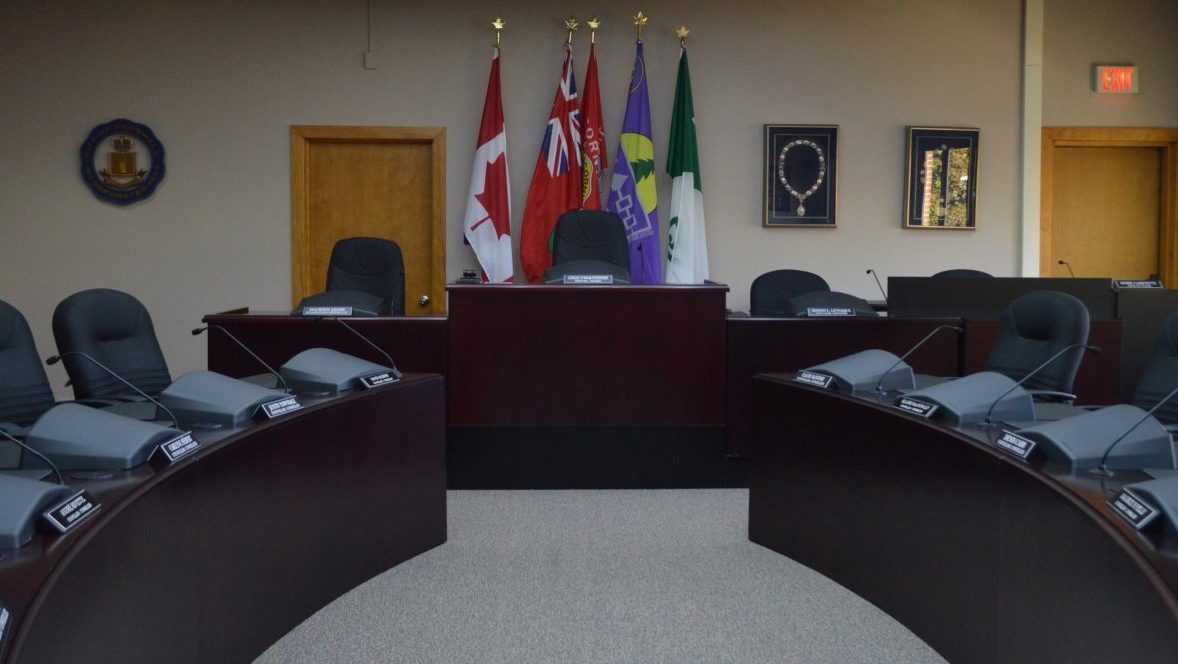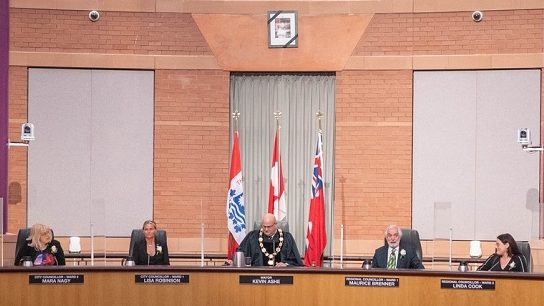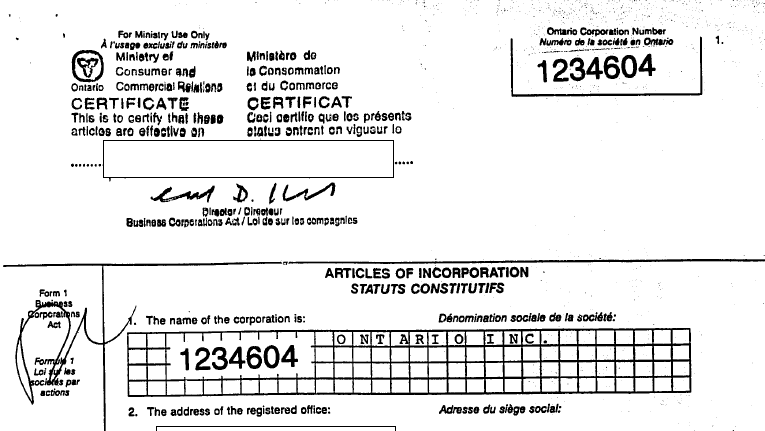Mayor’s role
The role of head of council is to:
- Act as the municipality’s chief executive officer
- Preside over council meetings such that business is carried out both efficiently and effectively
- Provide leadership to the council
- Provide information/recommendations to council on policies, practices, procedures, to ensure transparency and accountability
- Represent the municipality at official functions
Councillor’s role
The role of a councillor is to:
- Represent the public and to consider the well- being and interests of the municipality
- Develop and evaluate the policies and programs of the municipality
- Determine which services the municipality provides
- Maintain the financial integrity of the municipality
- Ensure that administrative policies practices are in place to implement the decisions of council
- Ensure the accountability and transparency of the operations of the municipality
Municipal councillors also sit as members of a number of Standing Committees. These committees carry out much of the work of council and then report back to council with recommendations.
Responsibilities
A member of council has to balance the dual responsibility of representing the interests of their constituents with ensuring the long-term well-being of the municipality.
They must play 3 main roles:
These roles will sometimes overlap as you have to weigh complex decisions that have different advantages and drawbacks for the people vs the municipality, your ward vs the entire community and the short-term vs the long-term. Many decisions will have a lasting impact on the town long after your time in office.
Representative role
You were elected by your constituents to represent them, their views and concerns in office, but they will have conflicting opinions and interests on some issues so you will not be able to represent everyone equally, all of the time. You can, however, make their voices heard by responding to their inquiries, bringing the most pressing issues before council and ideally resolving them.
Your decisions may not be popular with everyone, but they are best made evidence-based and data-driven by taking into account all available information.
There may also be circumstances where decisions are made by designated staff who operate at arm’s length from the council, and where it could be inappropriate for elected officials to interfere or be seen to be interfering. Examples of this include decisions made by statutory officers such as the clerk, treasurer, fire chief, chief building official or medical officer of health.
As defined in the Municipal Act section 224, it is the role of council:
- to represent the public and to consider the well-being and interests of the municipality;
- to develop and evaluate the policies and programs of the municipality;
- to determine which services the municipality provides;
- to ensure that administrative policies, practices and procedures and controllership policies, practices and procedures are in place to implement the decisions of council;
- to ensure the accountability and transparency of the operations of the municipality, including the activities of the senior management of the municipality;
- to maintain the financial integrity of the municipality; and
- to carry out the duties of council under this or any other Act.
These individuals may also be acting in accordance with accountability provisions under other pieces of legislation, which may impact their advice to council.
If your municipality does not have a policy for handling public inquiries, complaints, and frequently asked questions, you may want to consider working with council and staff to develop such a policy. The Ontario Ombudsman encourages the development of local complaints processes, and you may wish to consult the Ontario Ombudsman’s tip sheet for developing a local process.
Policy-making role
Council’s role in policy-making is important to providing direction for municipal operations. Policy-making is another key council responsibility identified in section 224 of the Act.
Many council decisions are routine, dealing with the ongoing administration of the municipality, but others establish the principles and direction that may determine the municipality’s future actions. These are often considered to be policy decisions. Some policies can be specific, such as a by-law requiring dogs to be kept on leashes in public areas, and others can be broader and more general, such as approval of an official plan.
participating in debates and making decisions regarding by-laws, policies and proposed projects in council and committee meetings;
Policy-making may involve a number of steps and requires council to:
- identify an issue that needs to be dealt with
- reach agreement on the facts of the issue, making sure the objectives are met
- give direction to staff to research the issue, identify the available options and report back to council with recommendations
- engage members of the public on the issue and consider their feedback
- consider the information provided by staff, taking into account demands on time, funding and other issues
- make a decision based on the best course of action available and adopt a policy
- direct staff to implement the policy
- work with staff to evaluate the policy and to update or amend it as required
In many cases, council refers a policy issue to a committee of council to take advantage of the committee’s expertise in a particular area or to reduce council’s workload. A committee of council may follow the same steps outlined above in making policy or making recommendations back to council.
In practice, however, policy-making is sometimes less orderly because of:
- a rapidly changing environment, the complexity of issues facing local government, and the difficulty in singling out problems that require more immediate attention
- differing and sometimes strongly held views by stakeholders and members of the public
- the lack of time to identify all possible alternatives and to conduct detailed research and analysis
- the legal and financial limits on what council may do
- the complexity of implementing policies and developing ways to monitor and evaluate them
Council is the municipality’s primary policy-making body. Staff can provide information and advice to help inform council’s policy decisions.
Municipal staff are responsible for implementing policies approved by council. As a result, your council may wish to develop appropriate reporting mechanisms so that council can follow implementation progress.
Stewardship role
Council’s objectives are to ensure that the municipality’s financial and administrative resources are being used as efficiently as possible.
There is a fine line between council’s overall stewardship of the municipality and the administration’s management of day-to-day activities. Generally, council monitors the implementation of its approved policies and programs, but the practical aspects of its implementation and administration are a staff responsibility.
The chief administrative officer is a discretionary position whose responsibilities are set out in section 229 of the Act.
229. A municipality may appoint a chief administrative officer who shall be responsible for,
- exercising general control and management of the affairs of the municipality for the purpose of ensuring the efficient and effective operation of the municipality; and
- performing such other duties as are assigned by the municipality.
This approach, if chosen, can help separate policy making from policy implementation, with council concentrating on policy making and the chief administrative officer and others implementing the policy.
Before council can monitor and measure the municipality’s administrative effectiveness and efficiency, it may wish to become familiar with policies currently in place. With input from municipal staff, council can determine whether the policies are functioning well or if changes are necessary.
As part of this process, council may wish to:
- define corporate objectives and set goals and priorities
- establish clear administrative practices
- provide specific guidelines and directions to staff on the applications of those policies
- delegate appropriate responsibilities to staff (to the extent permitted under municipal legislation)
- establish a personnel management policy that emphasizes the recruitment, hiring, evaluation, training and development of staff
- ensure that policies with respect to most operations of the municipality are in place, with special note to mandatory policies required by the Act
- develop protocols for the flow of information between council and staff; and
- consider establishing a protocol for sharing approaches with other local governments and indigenous communities that share a common interest in community health, culture and economy
To be effective in this stewardship role, council may wish to have processes in place to help ensure that:
- policies adopted by council are being implemented
- staff are administering services and programs as council intended
- rules and regulations are being applied correctly and consistently
- funds are being spent only as authorized, and the municipality’s resources (financial and otherwise) are being used appropriately and as efficiently as possible
Establishing and following such policies and guidelines helps council leave the day-to-day details for staff to manage. Council is freer to deal with exceptional situations, ensure that policies are current and listen to issues raised by the public to represent the broader community interest.
Requirements
- Follow the Code of Conduct
Municipal responsibilities
Municipal councillors help with questions, concerns, or issues you may have accessing municipal government responsibilities, such as:
- Social Housing
- Storm Sewers
- Tax Collection
- Water and Waste Water (Sewage)



Comments
We want to hear from you! Share your opinions below and remember to keep it respectful. Please read our Community Guidelines before participating.